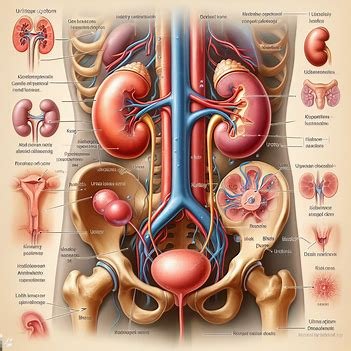Yes, kidney stones can cause back pain, often severe and sharp.
Direct mechanisms:
- Blockage: When a kidney stone becomes lodged in the ureter, the tube that carries urine from the kidney to the bladder, it can block the flow of urine. This causes pressure and stretching in the kidney and ureter, leading to pain.
- Inflammation: The irritation caused by the stone can also lead to inflammation in the kidney and surrounding tissues, which can further exacerbate the pain.
- Spasms: The pain from the kidney stone can trigger muscle spasms in the back and abdomen, causing additional discomfort.
Indirect mechanisms:
- Increased urination: The presence of a kidney stone can irritate the bladder, leading to frequent urination and urgency, which can put additional strain on the back muscles.
- Nausea and vomiting: The pain and irritation caused by the kidney stone can trigger nausea and vomiting, which can put further strain on the back muscles and worsen the pain.
- Anxiety and stress: The discomfort and uncertainty associated with having a kidney stone can lead to anxiety and stress, which can manifest as physical symptoms like muscle tension and pain.
Treatment options:
- Pain relievers: Over-the-counter pain relievers, such as ibuprofen or acetaminophen, can help manage mild to moderate pain.
- Hydration: Drinking plenty of fluids helps flush out the kidney stone and can also help reduce pain and discomfort.
- Medications: Prescription medications can be used to relax the muscles in the ureter and help pass the stone.
- Lithotripsy: This procedure uses shock waves to break up the kidney stone into smaller pieces that can be passed more easily.
- Ureteroscopy: This procedure involves inserting a small scope through the urethra and bladder to locate and remove the kidney stone.
- Surgery: In rare cases, surgery may be necessary to remove a large or complex kidney stone.
Definitions:
- Kidney stone: A hard, mineralized deposit that forms in the kidney.
- Ureter: The tube that carries urine from the kidney to the bladder.
- Spasm: An involuntary contraction of a muscle.
- Nausea: The feeling of wanting to vomit.
- Vomiting: The forceful expulsion of the contents of the stomach.
- Lithotripsy: A procedure that uses shock waves to break up kidney stones.
- Ureteroscopy: A procedure that uses a small scope to locate and remove kidney stones.
When to see a doctor:
It is important to see a doctor if you experience any of the following symptoms of a kidney stone:
- Severe back pain or flank pain
- Blood in the urine
- Nausea and vomiting
- Fever
- Difficulty urinating
- Painful urination
- Inability to pass urine
Additional resources:
- National Institute of Diabetes and Digestive and Kidney Diseases: https://webharvest.gov/peth04/20041017202328/kidney.niddk.nih.gov/kudiseases/pubs/stonesadults/index.htm
- Mayo Clinic: https://www.mayo.edu/research/departments-divisions/department-urology/research/kidney-stones
- American Kidney Fund: https://www.kidneyfund.org/
- YouTube video on kidney stones: https://m.youtube.com/watch?v=u6wbRUf2NF8
Remember: Early diagnosis and treatment of a kidney stone can help prevent complications and reduce pain. If you suspect you may have a kidney stone, seek immediate medical attention.
Follow-up Questions about Kidney Stones and Back Pain:
Specifics of Pain:
- What type of back pain do you experience (e.g., sharp, dull ache, stabbing)?
- Where in your back do you feel the pain (e.g., lower back, flank, both sides)?
- Does the pain come and go, or is it constant?
- Does the pain radiate or spread anywhere else (e.g., abdomen, groin)?
- Does the pain worsen with specific movements or activities (e.g., standing for long periods, driving)?
- What makes the pain feel better or worse?
Relationships:
- Does the back pain interfere with your daily activities, work, or hobbies?
- Has the back pain affected your sleep or mood?
- Have you noticed any changes in your relationships due to the back pain?
- Have you discussed your concerns about the back pain with your partner or family?
- Have you found any support groups or online communities helpful in dealing with the back pain?
Treatment and Management:
- Are you currently taking any medications for the kidney stone or back pain?
- Have you tried any other treatments, such as pain relievers or home remedies, to manage the back pain?
- Have you been advised to make any lifestyle changes, such as drinking more fluids or avoiding certain foods?
- How effective have the treatments and management strategies been in relieving your back pain?
- Are you experiencing any side effects from the medications or treatments?
Other Potential Causes:
- Have you been diagnosed with any other medical conditions that could contribute to back pain (e.g., muscle strain, arthritis)?
- Have you recently experienced any injuries or falls?
- Do you have any other symptoms besides back pain that could be related to the kidney stone (e.g., blood in the urine, nausea, vomiting)?
- Have you discussed the possibility of other causes of the back pain with your doctor?
- Have you had any tests or imaging studies done to investigate the cause of the back pain?

